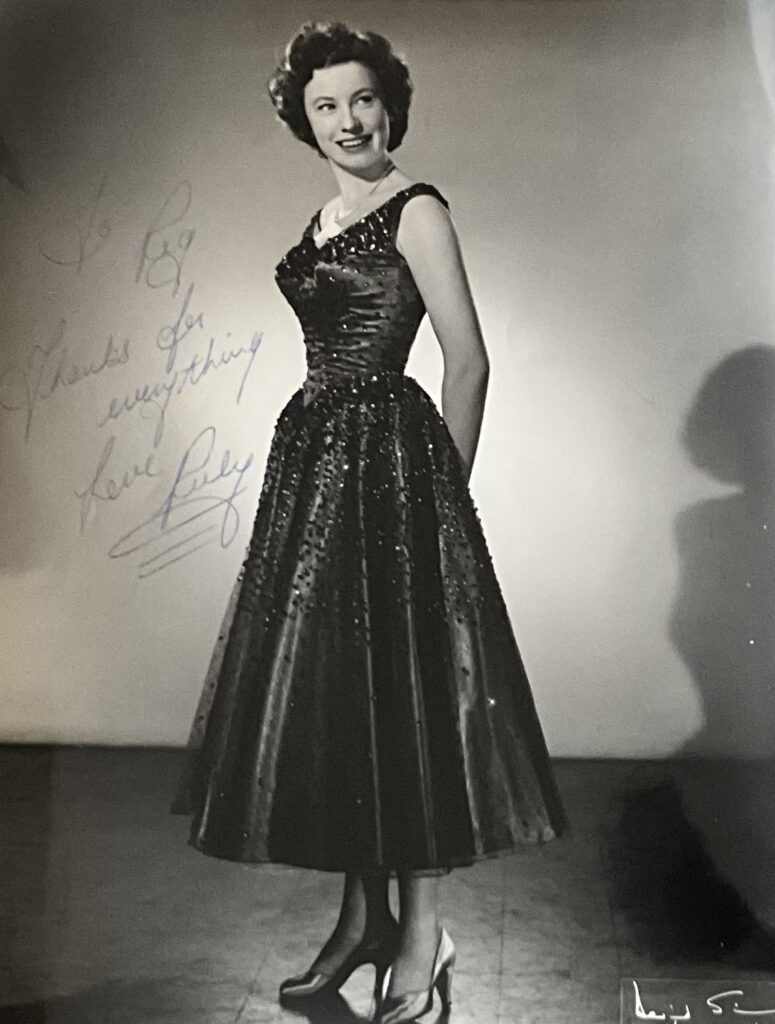
Rory Murray was born in 1935 in Belfast, youngest daughter among four children of Daniel Murray, originally from Scotland, and Wilhelmina or Winifred Murray (née Connolly). They lived in Moltke Street in the Donegall Road area of the city. An operation on her throat when she was a baby left her with a husky but unique, very appealing, and melodic voice. She appeared first in amateur concerts presented by her father in Belfast’s Ulster Hall, and toured Ulster as a child singer in variety shows. A well-known television producer, Richard Afton, spotted her and she made her broadcasting debut at the age of twelve, though laws regarding child performance meant she returned to Fane Street primary school until she was fourteen.
After a few months in jobs in a bakery, sweet shop, and handkerchief factory, she toured Ulster, Scotland, Ireland, and England in revues and variety shows. At the age of nineteen (1954) she went to London in a touring revue, ‘Mrs Mulligan’s hotel’. Alton saw her again at the Metropolitan Theatre, Edgware Road, and realised that her charm and talent, along with her youth, gave her a special quality. He offered her a post as resident singer on BBC Television’s ‘Quite contrary’, which he was producing; after her first appearance on the show, she signed a recording contract with Columbia Records. Her second release, ‘Heartbeat’, rose to number 2 in the UK chart in early February 1955. The same month her next release, ‘Softly, softly’ went into the chart at number 4, and reached number 1 a week later. It was a plaintive love ballad, and became her signature tune. A few weeks more, and she had five singles in the Top Twenty at the same time, an achievement equalled only by Elvis Presley, and by Madonna in the 1980s, but not excelled. In 1955 she also released the LP When Irish eyes are smiling. Murray’s hits included ‘Let me go, lover’, ‘If anyone finds this, I love you’ (with Anne Warren), ‘Happy days and lonely nights’, ‘Evermore’, ‘I’ll come when you call’, ‘Real love’, ‘Little white lies’ (1957), ‘Goodbye Jimmy’ (1959), and ‘You are my first love’, which she sang over the opening titles of the 1956 film musical It’s great to be young. With the Norrie Paramor Orchestra she recorded the singles ‘My little corner of the world’ and ‘I’ll remember today’.
She appeared with some success in 1956 in the comedy film A touch of the sun with Frankie Howerd and Dennis Price, playing a singing chambermaid. In the 1950s Ruby Murray achieved the heights of stardom in the UK: she had her own BBC television show, starred at the London Palladium with Norman Wisdom in ‘Painting the town’, appeared in a royal command performance, and toured the USA, North Africa, and Malta. In 1956 Frank Sinatra told her: ‘You’re a great singer and I am your greatest fan.’ While appearing (1957) in a Blackpool summer season she met Bernie Burgess, member of a vocal group, the Jones Boys. Ten days later (23 August 1957) they married in secret, against her parents’ advice. Although he had wanted her to give up singing, Burgess then became her manager and during the early 1960s they toured as a double act. In 1962 she released the album Irish . . . and proud of it on the Capitol label. A live album, Live on St Patrick’s day, with Brendan O’Dowda (1925–2002) and others, recorded at Merrion Hall, Dublin, was released in 1963. In 1970 she released the LP Ireland’s own Ruby Murray (UA International). Though the single ‘Change your mind’ was a modest hit in 1970, singles chart success thereafter eluded her. A 1977 LP with the same title included some contemporary songs such as ‘Raindrops keep falling on my head’, while revamping some of her earlier hits. Her 1989 album Ruby Murray’s EMI years included songs that she regularly featured in her act, including ‘Scarlet ribbons’, ‘Mr Wonderful’, and ‘It’s the Irish in me’. Other album releases reflected her popular Irish repertoire: Here’s to the Irish (Coral), The spinning wheel (Fontana), and The voice of Ireland (Capitol).
The pressure of trying to revive her career in the 1960s contributed to her growing reliance on alcohol and valium, which in turn helped cause the breakdown of her marriage; she had an affair with Frank Carson (qv), the Belfast comedian, was divorced in 1977, and lost custody of her two children, a boy and a girl. She suffered two nervous breakdowns, and was once arrested on a charge of being drunk and disorderly. Based in Torquay, Devon, in the 1980s and early 1990s with her second husband, the impresario Ray Lamar whose first marriage proposal she had turned down years before they finally married in 1993, she still appeared in cabaret and in nostalgia shows with other stars of the 1950s. Alcoholism caused irreparable liver damage and led to liver cancer, the cause of her death in a Torquay hospital on 17 December 1996.
A play about Ruby Murray’s life, set in the Belfast of the 1950s, was written by Marie Jones, and performed in 2000; on 29 March 2006 Belfast city council unveiled a plaque in the Ulster Hall in honour of one of Belfast’s best known and best loved performers.
John Bennett and Rory Carroll, ‘Ruby Murray’, Irish News, 18 Dec. 1996, pp 1, 4 (photos); Irish Times, 18 Dec. 1996 (photo); Independent (London), Times, 18 Dec. 1996; Sunday Tribune, 22 Dec. 1996; McRedmond; Encyclopedia of popular music (1998); ‘UK Top 40 hit database’ at www.everyhit.com/retrocharts; ‘Your place and mine-topics-Ruby Murray’, BBC Northern Ireland website
From The Dictionary of Irish Biography contributed by Andrew O’Brien and Linde Lunney.

